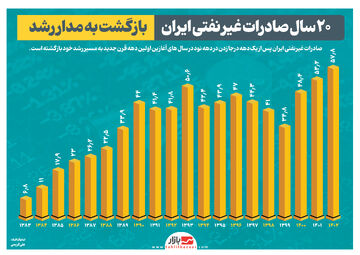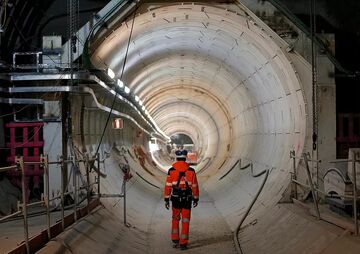Tehran(Bazaar): Mukhtar Mussabetov in interview with Bazaar News Agency said: any industry or that suffers from high bureaucracy, high centralization, slow interaction, lack of transparency will get the greatest efficiency and effectiveness, and so may benefit from decentralization.
Mukhtar Mussabetov is A chief executive officer and a serial entrepreneur with over 20 years of experience in Canadian, the US and international hi-tech markets, including recent 5 years in the blockchain industry and a proven ability to develop nascent startups up to mature companies and to develop large, industry-specific social media communities.
As a founder and CEO, I have built 5 successful hi-tech startups, companies, and platforms from scratch.
Following is the full text of the interview:
Bazaar: In your opinion, what will be the perspective of using blockchain in industries in the coming year (2022)?
Mussabetov :The potential expansion of blockchain in specific industries will be based on the following principles:
1. Overall, it will mainly depend on the specifics of each nation but looking at industries where people are “sick and tired” would be a good starting point.
2. Continuous development of blockchain infrastructure. For example, Bitcoin’s mission is to make people less dependent on global regulatory, corporate and governmental powers. So, more people will look for cryptocurrency alternatives to fiat to increase their personal earnings, savings, and investments and it will certainly lead to more growth in DeFi, FinTech, etc. So, blockchain will continue to replace traditional centralized systems and platforms. As a result, traditional banking and investment industries will continue shrinking. The infrastructure development would also involve developing stronger security systems designed specifically for blockchain infrastructure.
3. Another big industry where blockchain would grow at a faster pace is decentralized platform marketplaces.
4. Basically, any industry, where people would be allowed to participate actively as fully empowered economic players (opposite to users, clients, customers, etc. as defined by the current centralized systems) due to blockchain adoption will experience higher adoption and growth.
5. The most sustainable blockchain investments should be expected in industries and activities where new, higher public and member value is created.
6. Political systems will be the last sphere that will be transformed by blockchain. I think overall progress in blockchain adoption will gradually make political systems as we see them today needless, and they will degrade like all previous social orders. However, this time blockchain has a potential to make such transition peaceful and gradual, i.e., without revolutions, wars, fighting, blood, and other typical consequences of social order change as we saw today or in the past or know from history.
Bazaar: What should be done to make managers more familiar with this technology?
Mussabetov : Managers should have opportunities to see real-life cases of how blockchain can really improve their bottom lines in making better strategic decisions, optimizing business processes, more efficient resource management, etc.
Bazaar: In what industries can blockchain lead to better efficiency and effectiveness?
Mussabetov : I can give you a very simple example that everyone can understand. To guarantee quality of food on our tables, we need to be able to track it from its original source, i.e., where it was grown, harvested, caught, or otherwise produced; delivery routes; time in transit; pricing; and many other factors. This range of transparency does not exist yet and all that data is owned, controlled, stored, and eventually manipulated by different players participating in the process to gain more profit, cut costs, and allow those players to take unfair advantage of ordinary people. And, as people, we can see these sorts of manipulations around us on an everyday basis, especially in pricing.
So, to change the existing rules in the food industry we need to change our thinking first to identify ourselves as stakeholders of the food industry, not “consumers” as corporations and governments call us, and we have the right to know everything that affects the quality of food on our tables. Because at the end of the day we, people, pay for that. Introducing blockchain in the food industry will inevitably push corporations to improve and optimize overall management and governance and allow people to have better control over corporate greed. And at the end, this will lead to better and cheaper food on our tables.
A higher level and more complex example is global financial systems like SWIFT. These systems are highly centralized and controlled by global superpowers and It’s not a big secret that often, the superpowers exploit them for economic suppression of smaller nations including their entities to impose their own political agendas. So, for instance, Bitcoin as a concept, may work well in such circumstances and provide independent financial channels to participate in global trade. In the same way, new, decentralized, multicurrency, financial systems can be built on blockchain to support truly free and politically neutral trade, economic and investment cooperation.
In short, any industry or even activity that suffers from high bureaucracy, high centralization, slow interaction, lack of transparency, poor governance, and low-tech integration resulting in the most pain for people, enterprises, economies, and nations, will get the greatest efficiency and effectiveness, and so may benefit from decentralization. All this depends on individual business or country specifics.
Bazaar: What are the challenges of using a blockchain?
Mussabetov : We live in a world that was continuously built upon vertical governance for thousands of years and because of this fact, “vertical thinking” is deeply rooted in our minds and accordingly, in literally all spheres of our life: economic, social, business, etc. We ended up in this situation because nations and humanity in general needed to optimize governance from cost and effect perspective and up to now, we did not have a proper technology that could help us to build effective and efficient governance systems and have full control over our own lives and our own future.
Now we have a blockchain technology which is horizontal by its very nature. However, it requires a radical shift in thinking to realize that we, the people, and not corporations, institutions, or governments, are true stakeholders in whatever happens to us and around us: from food we eat to directions of national economies we vote for.
Interview by Farahnaz Sepehri















نظر شما